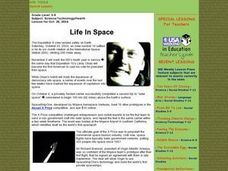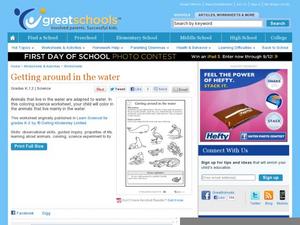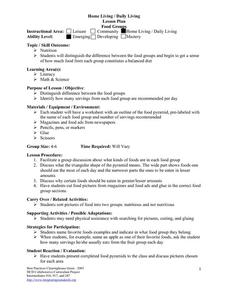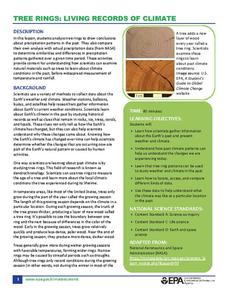Curated OER
Science Giants
Fifth graders research about the work and accomplishments of their chosen scientist. In this life science lesson plan, 5th graders explore how to become one. They prepare a presentation and share it with the class.
Curated OER
The Spider's Life Cycle
Students see that spiders have a life cycle, and reproduce by laying many eggs. We can count by ones, twos, fives, or as many as we want. They make two lists of animals on a chart.
Curated OER
Blue Planet: Seas of Life - Tidal Seas
After viewing the video Blue Planet: Seas of Life, young scholars review oceanic concepts. In this earth science lesson plan, students reflect on the effect tides have on living things and conduct research to create a "tidal trivia"...
Curated OER
A Year (a Day or a Week) In My Life as a Shorebird
Students describe the basic life history of one shorebird common to their area. They use the writing process which includes brainstorming, rough draft writing, peer editing, and re-writing to create a factually and grammatically...
Curated OER
The Life Cycle of the Butterfly
First graders, after listening to fictional and non-fictional literature about caterpillars, and observing caterpillars from egg to butterfly, write a "biography" of a caterpillar using appropriate vocabulary and time lines.
Curated OER
Frontier Life Story
Students undertake a similar (but not quite as drastic) adventure as that of Frontier House as they explore the day-to-day realities of frontier life through a Laura Ingalls Wilder story, and reflect on which time period suits them...
Curated OER
The Sun in Our Lives
Third graders identify the different parts of the sun. In this astronomy lesson plan, 3rd graders examine how the sun's energy drive life processes on Earth. They construct a model of a solar system using large rolls of toilet paper.
Curated OER
Marine & Aquatic Habitats Activities - Terrestrial Forests vs. Kelp Forests
Middle schoolers discuss concept and specificity of habitats, both marine and terrestrial, list similarities and differences in the habitats of a kelp forest and a terrestrial forest, compare types of organisms that occupy corresponding...
Curated OER
Who Am I? the Web of Life ... With a Twist!
Students are assigned a secret species identity. They identify with the help of the other players. Once all identities have been deciphered, players form a circle and, by passing a ball of yarn from "species to species", they form...
Curated OER
Classifying Commercial Marine Species
Young scholars investigate taxonomy. They explore some of the commercial marine species caught in Magdalena Bay and develop a classification system for presented animals.
Curated OER
Life Means Water Environment
Students investigate pH levels in bodies of water and experiment with acid/base reactions. In this water and pH lesson, students observe changes in pH levels of a sample solution and observe a Bronsted-Lowry reaction. Students...
Curated OER
The Use of Myths in Science
Young scholars are told stories, myths and legend to explain their world. After telling the tales and discussion them, students are assigned to write a myth that describes a familiar situation, such as why the school garbage cans are...
Curated OER
Life In Space
Students figure out how to design their own space station. They take a tour on the International Space Station to see what living there is really like, and how lessons learned on the ISS help pave the way for future space tourists.
Curated OER
Life Science Observations: Living vs. Non Living Things
Students investigate the difference between living and non-living things. For this life science lesson, students discover the different characteristics of living things and the natural or human created non-living things....
Curated OER
The Seven Characteristics of Life
Third graders investigate the characteristics of living and nonliving things. They conduct a research quest in order to identify the seven characteristics of life. Then students pick one aspect and use it to create a song meant to be...
Curated OER
Getting Around in the Water
Young scientists who are learning about the variety of environments that animals live in use a activity in order to choose animals that live, primarily, in water environments. There are eight pictures on the activity, and learners must...
Curated OER
Aquatic Science
What a terrific way to explore the pond habitat! Learners discuss the animal and plant life found in the Long Island area. They also discuss vocabulary terms, identify pollution concerns, and resource conservation.
Pearson
The Chemical Context of Life
An educational presentation includes atoms, molecules, the four major elements, as well as neutrons and protons. Additionally, slides focus on atomic number, mass number, atomic weight, polar and nonpolar covalent bonding, ionic...
Cold Spring Harbor Laboratory
Living Things Share Common Genes
Everything evolved from a common ancestor, but how did modern plants and animals develop so many more genes? Scholars use an online interactive to learn about the process. They begin to understand common genes with an animation, multiple...
Curated OER
Home Living/ Daily Living: Food Groups
What are the best foods to eat, and how much is too much? Kids discuss the importance of eating the right amount of each of the four food groups. They discuss the food pyramid and make meals by cutting and pasting foods from a magazine...
Curated OER
Interactions of Living Things
Is it a producer, carnivore, omnivore, scavenger, or decomposer? Different relationships among organisms are explored here. It is a simple, multiple choice assignment. Use it as a quick warm-up or quiz.
Curated OER
DNA, the Awesome Thread of Life
Learners examine how traits are passed to offspring. In this genetic reproduction lesson students develop a model of dna and learn about its structure, replication and function.
US Environmental Protection Agency
Tree Rings: Living Records of Climate
Open with a discussion on weather and climate and then explain how tree rings can provide scientists with information about the earth's past climate. Pupils analyze graphics of simulated tree rings from various US locations for the...
Population Connection
A Demographically Divided World
Did you know that birth and life rates vary across the world? The resource, the second in a six-part series, discusses just how demographics differ across countries and why it might be the case. Scholars complete worksheets, watch...























